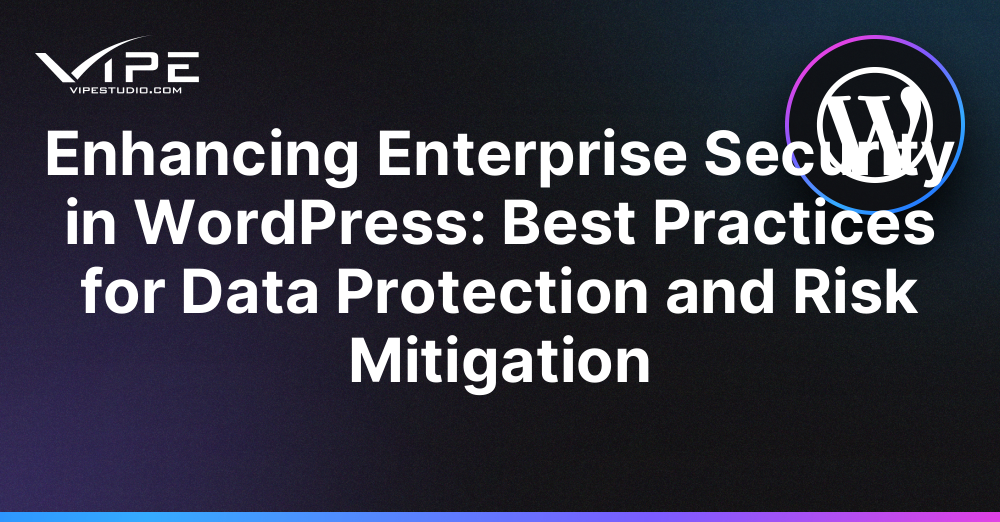04.02.2025
WordPress Development
Enhancing Enterprise Security in WordPress: Best Practices for Data Protection and Risk Mitigation
READING TIME: MIN
Table of Content
As enterprises increasingly rely on WordPress for their digital presence, security has become a top priority. Large-scale websites often store sensitive data, manage multiple user roles, and integrate with third-party applications—making them attractive targets for cyber threats. A robust security strategy is essential to protect business assets, maintain customer trust, and ensure regulatory compliance.
In this article, we explore essential best practices for securing enterprise WordPress websites against potential risks.
Why Enterprise-Level Security is Crucial for WordPress
Unlike smaller websites, enterprise WordPress installations are often complex, featuring custom development, API integrations, and high user traffic. Security vulnerabilities can lead to:
- Data Breaches: Exposing customer or business data can lead to financial and reputational damage.
- Website Downtime: Cyberattacks can disrupt operations, resulting in lost revenue.
- Compliance Violations: Enterprises handling user data must comply with regulations like GDPR, HIPAA, or CCPA.
- Malware Infections: Hackers may inject malicious code to steal information or damage SEO rankings.
Choosing a Secure Hosting Environment for WordPress
Enterprise websites require a hosting solution that prioritizes security. Businesses should opt for:
- Managed WordPress Hosting: Providers like Kinsta, WP Engine, and SiteGround offer automated updates, firewalls, and malware scanning.
- Dedicated or Cloud-Based Servers: Using AWS, Google Cloud, or DigitalOcean allows for strict security configurations.
- Regular Server-Level Backups: Daily automated backups ensure quick recovery in case of data loss.
- Integrated Web Application Firewall (WAF): Solutions like Cloudflare and Sucuri block malicious traffic before it reaches your site.
Implementing Strong User Authentication and Access Controls
Weak passwords and uncontrolled user access pose significant security risks. Enterprises should enforce:
- Two-Factor Authentication (2FA): Adding an extra layer of security prevents unauthorized logins.
- Role-Based Access Control (RBAC): Limiting user privileges ensures that only authorized personnel can modify sensitive settings.
- Regular Password Updates: Enforcing complex passwords and expiration policies reduces security vulnerabilities.
- Login Monitoring and IP Restrictions: Plugins like Wordfence allow tracking of suspicious login attempts.
Keeping WordPress Core, Themes, and Plugins Updated
Outdated software is one of the leading causes of WordPress security breaches. Enterprises must:
- Enable Automatic Updates: Keeping WordPress core files up to date protects against known vulnerabilities.
- Use Trusted Plugins and Themes: Only install software from reputable developers and regularly review their security track record.
- Remove Unused Plugins: Deactivating and deleting unnecessary plugins minimizes potential attack vectors.
- Conduct Security Audits: Regularly reviewing site configurations helps identify potential weaknesses.
Protecting WordPress with Advanced Security Plugins
Enterprise websites should leverage security plugins to enhance protection. Recommended tools include:
- Wordfence: Provides firewall protection, malware scanning, and real-time traffic monitoring.
- Sucuri Security: Detects vulnerabilities and offers website integrity monitoring.
- iThemes Security: Strengthens WordPress login security and prevents brute force attacks.
- MalCare: Automates malware detection and removal without overloading the server.
Securing APIs and Third-Party Integrations
Many enterprises integrate WordPress with external applications, such as CRMs, ERPs, and marketing platforms. To secure API connections:
- Use API Authentication: Implement OAuth, API keys, or JWT tokens for secure communication.
- Limit API Endpoints: Restrict access to only necessary API calls.
- Encrypt Data Transfers: Using SSL/TLS ensures data is encrypted in transit.
- Monitor API Activity: Logging API requests helps detect unusual patterns or unauthorized access.
Implementing Regular Security Audits and Penetration Testing
Continuous monitoring and testing are vital for enterprise WordPress security. Best practices include:
- Security Audits: Conduct periodic assessments of configurations, user roles, and access logs.
- Vulnerability Scanning: Use tools like WPScan to detect security flaws in WordPress installations.
- Penetration Testing: Hiring security experts to simulate cyberattacks identifies weaknesses before hackers do.
- Incident Response Plan: Having a predefined plan ensures rapid recovery in case of a security breach.
How Vipe Studio Strengthens Enterprise WordPress Security
At Vipe Studio, we specialize in securing WordPress websites for enterprises, ensuring data protection and compliance with industry standards. Our team provides custom security solutions, from implementing firewall protection to performing in-depth security audits.
If you’re looking to enhance your WordPress security, contact Vipe Studio today for a personalized security strategy.
Conclusion: Securing Your Enterprise WordPress Website is Non-Negotiable
Cyber threats are constantly evolving, making it imperative for enterprises to stay ahead with proactive security measures. By choosing secure hosting, enforcing strong authentication, updating software, and performing regular security audits, businesses can safeguard their WordPress websites from potential attacks.
Investing in security not only protects business data but also reinforces customer trust and ensures long-term success.
More on The Topic
- Navigating WooCommerce Performance: Real-World Strategies
- The Role of AI in WordPress Development Workflows
- Optimizing WordPress for Enterprise: Beyond Basic Caching
- WordPress and Headless Commerce: A Provocative Dilemma
- Decoupled WordPress Architecture: The Future or a Fad?
The content of this website is copyrighted and protected by Creative Commons 4.0.



